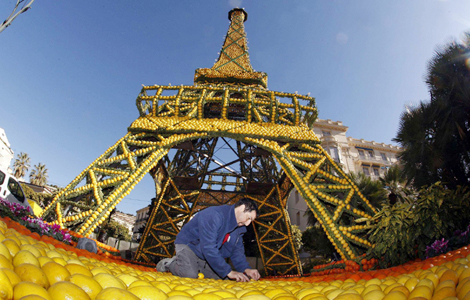TCM expert defends bile harvesting
Updated: 2012-02-17 08:01
By Jin Zhu and Zheng Jinran (China Daily)
|
|||||||||||
Farm staffer says bears treated in humane fashion
Editor's note: China Daily reporter Xu Lin was invited on an arranged tour of a bear farm operated by Guizhentang Pharmaceuticals last September to observe the process of extracting bear bile.
HUI'AN, Fujian - Dozens of bears rambled in a walled playground while some climbed a steel construction. When a staff member clapped his hands, hungry bears got close to him in expectation.
Such was the scene at a bear farm in Hui'an county, Fujian province, affiliated with Guizhentang Pharmaceuticals. The farm was established in 1993.
The efforts of Guizhentang to become listed on the Shenzhen Stock Exchange are being opposed by animal rights activists, who say that the company's practice of extracting bear bile for traditional Chinese medicine is cruel.
There are nearly 600 Asiatic black bears in the farm, which covers 80 hectares, and the company's aim is to raise 1,200 bears in total.
The staff member declined to reveal his name but said he had worked there for three years after graduating from college with a major in animal management.
"These are all young bears, and they have sufficient space to exercise in the farm. When they reach the age of 3, they will receive an operation," he said.
The surgery makes use of the contractility of the gallbladder cortex and moves it a little bit to make a natural tube. The cut on the surface of the gallbladder is less than 1 centimeter but becomes about 3 millimeters when it scars over, just like the core of a basketball valve, he said.
The staff member directed visitors to the room where bile is extracted from the bears.
The room was connected by a gate to a small cage, which is a little larger than the size of a bear. When a worker opened the gate and put food in the small cage, the bear crawled and lay down on his chest to have its meal.
The worker quickly sterilized the wound on the bear's belly with an alcohol-dipped cotton ball and inserted a slim 11-centimeter drainage tube into it. As the bear bile flowed down through the hollow iron tube into a container, the bear continued to eat.
The feeder said the process lasts about 15 to 20 seconds. More than 300 bears are drained at 6 am and 5 pm each day, and about 8 to 10 milliliters of bear bile produces 1 gram of bile powder.
He said a bear can secrete 1,500 to 1,800 milliliters of bear bile every day, while workers extract about 130 milliliters on average in a day. In this way, a bear can provide bile for about 20 years.
He insisted the bear's health is not affected but said they had no health reports to provide as evidence.
Hot Topics
Wu Ying, iPad, Jeremy Lin, Valentine's Day, Real Name, Whitney Houston, Syria,Iranian issue, Sanyan tourism, Giving birth in Hong Kong, Cadmium spill, housing policy
Editor's Picks

|

|

|

|

|

|






